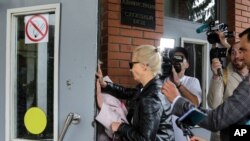Family and associates of Russian opposition leader Alexey Navalny accuse Moscow of blocking his medical evacuation to Germany to cover up what they say is an attempt to poison him.
Speaking to reporters outside the hospital in Omsk on Friday, Navalny’s wife, Yulia Navalnaya, and Ivan Zhdanov, a Navalny associate, said the decision put his life in mortal danger.
"They refuse to hand over Alexei for his further transporting,” Navalnaya said. “We certainly believe that it was made to make sure that a chemical substance which is in Alexei's body will dissolve. That's is why he is not handed over to make sure that particles of this substance will dissolve. He is not in a good shape. And we certainly cannot trust this hospital and we demand to hand him over to us so that we will be able to treat him in an independent hospital whose doctors we trust."
Navalnaya spoke out against the Kremlin after the head doctor said moving him would put his life at risk because he was still in an induced coma and his condition was unstable.
Navalny's team quoted a police officer as saying a highly dangerous substance had been identified in his body.
"We approached that transit police representative who had come up with a phone (in her hands),” said Zhdanov, director of Navalny’s anti-corruption foundation. “(We asked:) ‘What substance?’ She said: ‘It is confidentiality of an investigation, we cannot tell you, but this substance poses a deadly threat. This substance poses a threat to Alexei's life as well as to wider public. Everyone around has to wear protective coveralls.’"
The frictions arose as a German air ambulance landed in Omsk with the intention of flying Navalny to Germany for possible treatment.
The Kremlin said on Thursday that medical authorities would consider any request to move him to a European hospital and the government would launch a criminal investigation if a toxicology report indeed found the poisoning allegations true.
When asked about Navalny at the daily briefing Thursday, United Nations spokesperson Stephane Dujarric said, "We are following with the concern the reports that Mr. Navalny has a sudden illness. We obviously wish him a speedy recovery. Any allegations of suspected poisoning, if confirmed, should be fully investigated."
U.S. Sen. Ben Cardin, the ranking Senate member on the U.S. Helsinki Commission, told VOA’s Russian service Thursday the news about Navalny “is extremely concerning.”
“The pattern of assaults, poisonings, and other attacks on Russian opposition figures, journalists, and pro-democracy advocates highlights the intensifying threats to civil society, human rights, and media freedom in Russia. I encourage the Russian authorities to investigate this incident and hold accountable those found responsible,” Cardin said.




